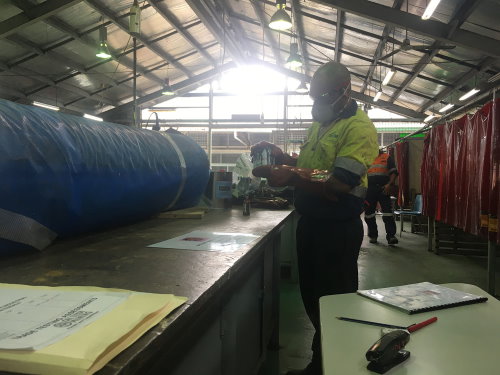About NATTB

The NATTB Secretariat is a Statutory Office within the Ministry of Labour & Industrial Relations, established in the early 1950s. It is mandated by an Act of Parliament – under the NATTB Act 1986 & Supporting Regulations 1991. The National Apprenticeship & Trade Testing Board compromises of industry and public organization representatives. The secretariat is overseen by the Director.
NATTB is committed to:
APPRENTICESHIP TRAINING
Apprenticeship is a universally accepted method of training by which a person, either male or female gains employment and is trained in a particular trade that he/ she is engaged in. An apprentice and an employer sign an agreement under which the apprentice agrees to learn a trade during the term of the apprenticeship (4 years) and the employer agrees to provide the opportunity and facilities for the apprentice to learn that trade
Entry requirements
- To become an apprentice, you firstly have to be over the minimum working age of 15.
- It is no longer a compulsory pre-requisite to have a NC 1-3 certificate to enter into an apprentice, however it is advisable to do so in order to have a better chance of entering into an apprenticeship.
- Apply to be employed as an apprentice with organizations that are registered under the NATTB as apprentice employers
Statistics for 2018:
- New Application Received & Processed - 354 Male + 34 Female = 388
- Endorsed Contract of Apprentices - 276 Male + 34 Female = 310
- Apprenticeship Completion - 269 Male + 12 Female = 286
- Number of Apprentices in Training - 1356 Male + 147 Female = 1511
- Current Employers - 130
- New Employers - 3
POLICY, PLANNING & RESEARCH MARKETING BRANCH
Manage the Apprentice Training System
- Format Application Process
- Coordinate Contract Signing
- Monitors and impose compliance to the Contract of Apprenticeship
- Coordinate approved apprentice extension courses
- Create completion of Apprenticeship Training Process
- Awarding Completion of Training Certificate
- Awarding qualification certificates for trade testing, assessors and trade test centres
- Record keeping
- Manage the NATTB database
TRADE TEST SYSTEM
Competency based assessment to recognize skills and knowledge – no matter how they were gained. Trade testing was established in the year 2000 as an alternate pathway to recognize skills and knowledge in trades and other occupations for the informal persons.
How it works:
Candidates pay a fee to be assessed
- Trade Test is normally conducted on weekends, 2 – 3 days
- Flexible in instruction & self-paced to suit individual & industry practices
- Candidates are required to provide personal safety wear
- All necessary tools and equipment are provided by the Trade Test Centre.
- Certified Assessors conduct assessment
- Candidates demonstrate doing a task based on skills and knowledge – irrespective of how it was gained
- Candidates receive a nationally recognized certificate if they are competent in all units of competence required for that level
- Candidates receive a statement of results
- A level 3 trade test certificate is recognized as a tradesman qualification throughout PNG
Trade Test Statistics conducted in the seven (7) core trades in 2018:
- New Application Registered 388
- Candidates Trade Tested and Certified 306

QUALITY ASSURANCE & ASSURANCE BRANCH
Manage the National Trade Testing Certification System (NTTCS)
- Trade test centre facility inspection and accreditation
- Conduct trade testing
- Conduct assessor training
Target Group. Skilled people who are not fortunate to attain formal recognition through the formal apprenticeship training system. The NTTCS is an alternate pathway to gaining such qualification.
DEVELOPMENT OF NATIONAL OCCUPATIONAL SKILLS STANDARDS
Role of the NATTB Secretariat is to facilitate the development of National Occupational Skills Standards (NOSS) using the Industrial Technical Committee (ITC). The Industry and public institutions play a vital role as they supply the skill expertise for the development of the NOSS. Driven by industry, the NOSS reflects the current workplace practices.
Recognized National Occupational Skills Standards currently in print:
- Auto Electrical
- Belt Splicing
- Best Practice in Counselling
- Boiler Operator
- Business Studies
- Carpentry Construction
- Community Development
- Confined Spaces
- Commercial Cookery
- Crane Operator
- Dogger & Rigger
- Electrical Fitting
- Food & Beverage
- Forklift Operator
- Front Office & Housekeeping
- Heavy Equipment Fitter
- Instrumentation Mechanic
- Maintenance Fitting Machining
- Metal Fabrication Welding
- Motor Vehicle Mechanic
- Plumbing
- Tour Guide
NATIONAL OCCUPATIONAL SKILLS STANDARDS DEVELOPMENT BRANCH
Manage the Development of the National Occupational Skills Standards (NOSS):
- Receive request from industry to develop occupational skill standard
- Identify ITC panel members
- Convene meetings to facilitate the development process
- Endorse draft standard through the NATTB Board
- Trial newly developed test instruments derived from the standards
- Custodian to the NOSS